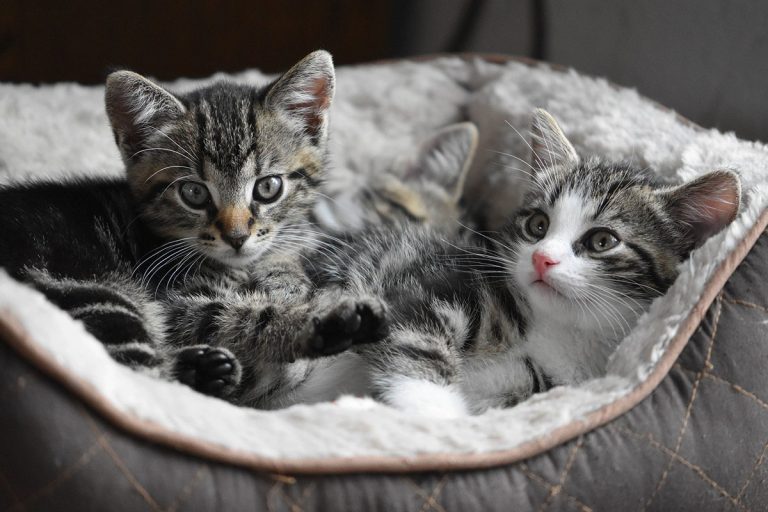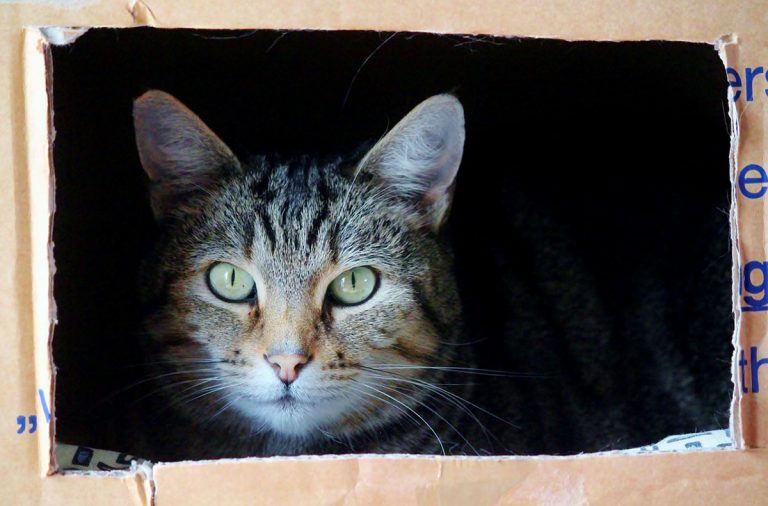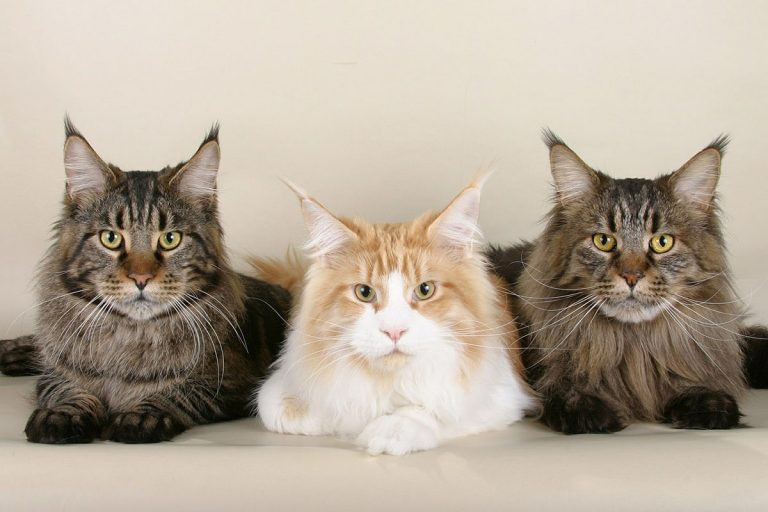Is your cat acting out of the ordinary? Stress and sickness can look almost the same. Read our guide to help you figure out: “Is my cat stressed or sick?”
DISCLAIMER: This post may contain affiliate links. If you click one of these links and decide to make a purchase, we may receive a small commission. This comes at no extra cost to you and helps to keep the site alive and up to date. If you want more information, please review our Privacy Policy. Thank you for your support!
Is My Cat Sick Or Depressed?
In order to determine whether or not your cat is ill, or just under a lot of stress, you need to look at the changes in her behavior and how often they occur. Different symptoms of stress, and stress itself, can also be symptoms of a wide variety of feline diseases. However, the timing and order of their occurrence, as well as their severity can tell you, and your vet, a lot of what you need to know to solve the puzzle.
Related Post: Is Pet Insurance Worth It For Indoor Cats?
Is pet insurance worth it for indoor cats? Read this guide to learn about pet insurance for cats and calculate if it is really worth it for your indoor cat.Symptoms Of Stress In Cats
Cats with anxiety can show any of the following signs and symptoms:
- Eyes wide open, dilated
- Huddled up in a small ball
- Hiding away in a corner
- Skittishness
- Purring
- Ears flat, turned backwards
- Matte, greasy coat
- Hair loss
- Litter box problems
- Loss of appetite
- Weight loss
- Occasional vomiting and/or diarrhea
There are many possible causes for stress in cats. Territorial disputes with other cats in the household, a perceived threat in their environment, a lack of attention, or having no safe place to call their own are all things that can contribute to a cat feeling uneasy or even depressed.
Disease can also be a factor. In terms of symptoms, pure stress, disease-related stress and illness by itself overlap quite a bit. If your cat is showing signs of stress, it is important that you deal with it as soon as possible. Lingering symptoms of stress can grow more severe over time and may mask underlying illnesses.
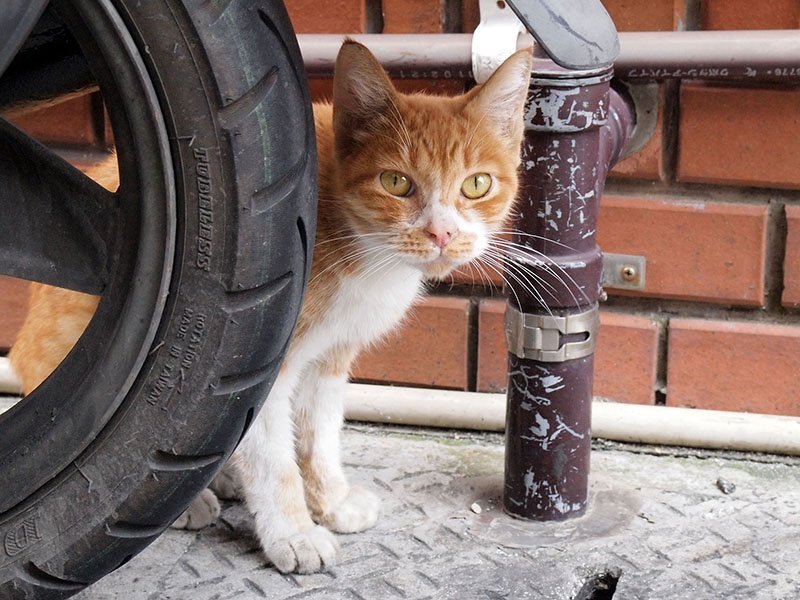
How To Calm A Stressed Cat
When cats are stressed the key is to rebuild positive associations with their environment, and with you. Greet your kitty in a sweet voice when you enter the room, as if you were talking to a baby. Get down to her level, but be careful not to box her in. She needs a way to escape if things get too intense for her.
You can try to calm her by blinking at her slowly. This shows her that you come in peace and aren’t interested in a confrontation. Cats also respond really well to being stroked softly on the cheek. If your cat leans into your hand or lifts her head to bear her neck, it’s a sign that she trusts you and enjoys being petted by you.
You can build up your cat’s confidence by giving her treats and playing with her. Get her out in the middle of the floor or lead her up on a bookshelf. Follow it up with a cuddle session and maybe a nice meal to really cement the positivity.
If you can’t get her interested in any of it, there might be an illness underlying her stress. Take her to the vet for a full check-up and don’t forget to tell your vet about any behavioral issues you’ve noticed in your cat.
Sick Cat Symptoms
Beyond any obvious physical injuries, these are the most common signs and symptoms of illness in cats:
- Stress and depression
- Sudden change in behavior
- Lethargy
- Whimpering
- Itching and/or rashes
- Severe hair loss
- Panting and/or increased heart rate
- Fever
- Increase or decrease in thirst or appetite
- Severe weight loss
- More or less frequent litter box use
- Frequent vomiting
- Soft and/or bloody stool
- Blood in urine
Stress itself, and everything that comes with it, can be a sign of an underlying illness. The biggest difference between most cases of stress versus most cases of illness (there are always exceptions) is that the symptoms of an illness tend to come on more suddenly and with more severity.
Unless you have just exacted a major change in your cat’s territory and routine, chances are any stress she feels developed and worsened gradually over time. Illnesses generally don’t show until they reach a tipping point, after which more and more symptoms quickly become evident. Symptoms of diseases also tend to be persistent, if left untreated, whereas symptoms of stress are more dependent on your cat’s changing mood.
If you suspect there is something wrong with your cat, but you can’t figure out whether it is stress-related or something else, always consult your vet and keep a closer eye on your cat’s behavior. Any change could be significant in determining what’s going on with her.
How To Comfort A Sick Cat
The best way to comfort a sick cat and ensure that she feels as good as she can under the circumstances, is to follow the advice of your veterinarian. Be diligent and consistent about her diet, fitness and mental well-being, so that she can live out her days stress-free.
If your cat unfortunately suffers from a fatal illness, prepare yourself and your family for this eventual loss ahead of time. Make a plan for her passing. Will you let nature take its course? Or will you step in and put her down before it gets to that?
For tips on dealing with a pet’s passing and a first hand account of how hard it can be to lose your beloved cat, please read our article on How To Deal With The Loss Of A Cat.
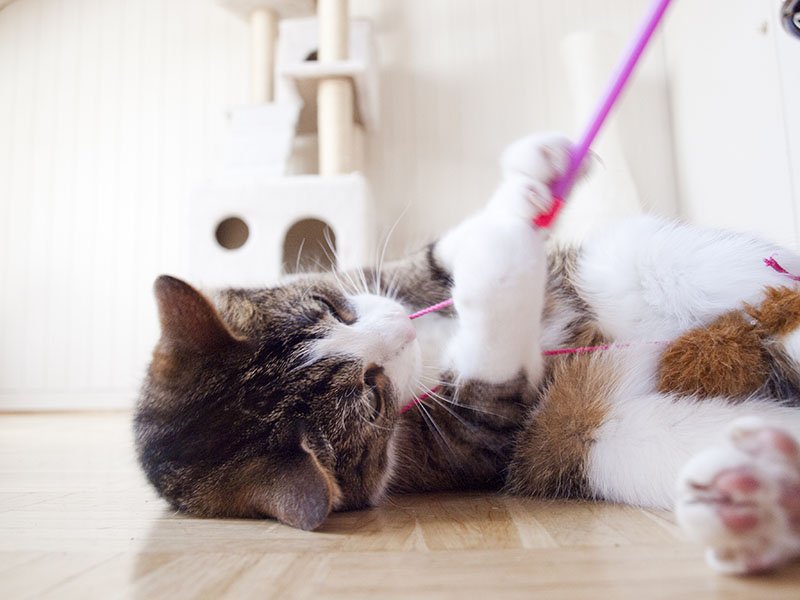
Can Cats Die From Stress?
Plainly put: yes.
If left unattended, a cat’s stress levels can rise to the point where she stops eating. Humans can last without food for up to 40 days. Cats, on the other hand, need daily sustenance of lean proteins to keep their organs functioning.
When a cat stops eating, her body will soon try to convert the few fat cells it has into energy. However, a cat’s liver isn’t designed to process fat and won’t be able to handle this. Within a matter of days, she will be in complete liver failure and die.
If your cat stops eating, don’t waste any time. Call your vet immediately. Consult with them about ways to get your cat interested in food again. If you really can’t get her to eat anything, take her in for a thorough check-up.
How To Tell If A Cat Is Dying
Cats are masters at hiding pain, even when they are dying. As we just discussed, a complete lack of appetite is definitely a sign that something is seriously wrong and that your cat may have given up.
Beyond that, it comes down to monitoring the situation closely with regular vet visits and objective observations of her behavior. Keep track of her overall fitness and attitude and weigh the pros against the cons throughout. Try to look at everything from her perspective.
When the time came for me to say goodbye to my cat Link, I struggled with making that final decision. It all happened so fast and I wasn’t ready to let her go. What finally pushed me over the edge was a simple evaluation of what her days looked like. It wasn’t good.
Over the course of about two weeks all of her ailments had gotten worse and there were now more bad days than good ones. On top of that, the definition of a “good day” had significantly changed as well. Taking a step back and looking at the situation, I realized that I had to put my own feelings aside and allow her to bow out gracefully, while she still could.
Final Thoughts
Cats are sensitive beings. Having a good relationship with your cat is key to giving her a happy, stress-free life. And it requires continuous work. She can’t speak up and you lead a busy life. So it’s very easy to get distracted from your play and cuddle routine and just assume that she will be okay with that.
Check in with your cat whenever you can. Try to avoid changing her routine too abruptly if your lifestyle changes. Give her something in return and establish new routines that make her feel included. A cat that feels appreciated and part of the family is far less likely to get stressed or depressed.








